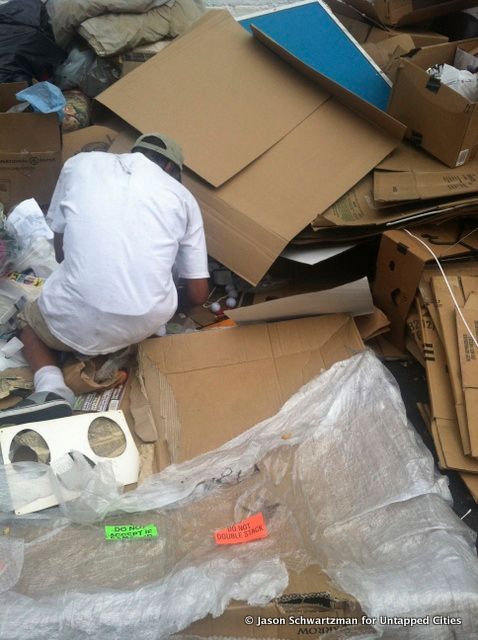

Standing beside a mountain range of U-haul trash bags, Franklin Joshua is trying to shake off the burning. Rubbing alcohol pools into centimeter-deep crevices in his palms. But it’s the best way he knows how to get clean—vital after hours of rummaging in vast networks of garbage. Joshua, 53 and homeless, scavenges from a dump on 11th Avenue and 23rd Street, avoiding bags stuffed with shrink-wrapped Christmas ornaments never hung, in favor of perfume bottles, women’s shoes, and anything that glints.
When mini-storage renters don’t pay their monthly bills, U-Haul disposes of their possessions. That’s where Joshua comes in. Born in Mount Sinai Hospital, he grew up on 119th Street until his mom moved the family to St. Thomas in the U.S. Virgin Islands when he was nine. He found his way back, living in Manhattan through Koch, Dinkins, Giuliani, and Bloomberg. But his New York is not a place many New Yorkers know.
“It’s not all that. Not the place you really think.” Two perfume bottles are missing from a case he finds in a trash bag. “Somebody must’ve took it out already,” he observes, another traveler on the worn trail of an invisible homeless economy. His haul of six pairs of shoes and two perfume bottles roughly doubles his possessions, stocked in a roller duffel bag he calls his house. “F. Joshua” is scribbled in black across the bag’s faded red.
Joshua hasn’t had his medicine in two days. Diabetic neuropathy afflicts him with excruciating nerve damage. Two days without relief is agony; usually more prone to sleep during the day and stake out late night drunks for donations, he can no longer afford to rely on the vicissitudes of kindness. His body, which he names part by part according to severity of pain, is becoming increasingly numb.
“Food is not important right now—it’s my medicine. I could get food to eat in the garbage. I could’ve ate down there [the Western Beef bottle dispensary]. I need my medicine. ”He says the medicine costs upwards of fifty dollars. Bottles and cans he harvests from trash bins around the city net him 5 cents a pop. He picks up pennies and rolls them, searching for older, valuable ones. He buys a dozen socks for six dollars, sells them for ten.
And he probes the exiled U-Haul bags, feeling for jewelry sliding down the sides to the corners. He has an eye for the little specks, he says. “You ever heard it said this? The rich man’s trash is the poor man’s treasure.”

The Struggle
If he fails to translate the street detritus into enough cash, the only thing that can kill the pain, he says, is drugs, dirt cheap, but expensive in that they start their own ugly cycles, stunting any upward momentum. Adding to his hardship is a brutal July heat that drains him of energy. He depends completely on water, New York his desert. “It’s the only thing that keeps me going. Like gasoline in your car.”
If he eats something, his whole body shuts down. Often he’ll pass out and wake up with his possessions gone. He has no one to guard them; his bag used to be a cart. Robbery is frequent and inevitable. A damaged back limits how much Joshua can carry in addition to the tremendous bag of bottles slung over his shoulder and his house, newly encumbered with a satchel of abandoned National Geographics he intends to sell for 25 cents each.
He limps to different safe spots, camouflaging certain possessions in garbage so he can return to them later—small strategic gambles. Here, his masterful knowledge of the Lower West Side pays off. “I used to stay in the Meatpacking District when it was all meatpacking.” Joshua’s near-encyclopedic memory for spatial change stems partially from walking the same streets every day and partially from his own contributions to the area’s evolution. He painted the Chelsea Inn (formerly called the Terminal, he points out) from penthouse to lobby.
In 1981, when he returned to the city in his early twenties, he cleaned floors and unloaded trucks full of furniture. He worked and he saved money. But after a while, he started using cocaine. Later, he robbed a taxi driver for drug money. Then: jail.
Joshua lost his job, his savings, his support system. He lost his home. He’s tried to find work but hasn’t had much luck. A 24-hour car wash in Chelsea won’t hire American, he says. Some people help, some people don’t, he adds. He absorbs insults like get the fuck outta here and get a job. “Everybody got a different opinion. I don’t really got an opinion—I just see it for what it is: You gotta survive, you gotta live, you gotta eat.”
In the bowels of a Western Beef market, Joshua packs bottles and cans into a recycling machine, turning them into smaller, flattened versions of themselves. He shares a few Way Back Whens with some Western Beef employees, all of them smiling, nodding, remembering, surrounded by stacks of factory-sealed Fiji Water and Orange Crush.
He is unfailingly polite to anyone he comes across, in a way that is instinctual rather than calculated for pity. If he bumps into someone with his aggregated wingspan of garbage bags: “So sorry.” Around areas he forages, he offers to help any way he can: “No charge, boss.”
An Unlikely Friendship
In the strange surf of the New York City street, random interactions have a way of becoming something more. In 2001, he met wayward Canadian artist Attila Richard Lukacs, known for his sensationalistic portraits of skinheads. One day twelve years ago he sent Joshua to the ATM machine to get some money for him. “My mind was not to come back with the credit card, cause I got a pin number and I got a credit card. And he sent me to withdraw 600 dollars which came out like that.”
On 13th Street between Washington and 9th Avenue, he remembers. “While I’m waiting for the bus, my mind hit me and I’m like ‘wait a minute, where you goin’ with the man’s credit card and his money?’” Out of that decision grew an unlikely friendship.
Whereas now Joshua scrounges for odd jobs cleaning rat shit and has to deal with being stiffed by exploitative proprietors, Rick paid him 21 dollars an hour (an hour, Joshua emphasizes) just to oversee guys loading his art onto moving trucks.
After a year on crystal meth, Rick was unhinged: He broke into his own studio (it’s a restaurant now, Joshua notes), shattering glass with a hammer, leading to his eviction and departure from New York. The documentary Drawing Out the Demons recorded Rick’s last days in New York. The film covers the artist at his lowest, rawest nadir, but lingers long enough to observe his parents using the last of their money to invest in his recovery. It concludes with a humbled, thoughtful version of Rick, working again in Canada.
Joshua appears in the documentary—two minutes worth of a cameo, stretched over a few weeks time, a version of himself twelve years younger, fuller, healthier, infused with more energy. He even rides a bike Rick gives him, secured with a heavy chain the length of a snake. But not much has changed. The euphoria of the bike acquisition is blotted out by an abrupt loss of every single one of his possessions. As a distressed Joshua recounts to his friend the hauling of his property into the trash, a drugged Rick tonelessly says, “Life is shitty, isn’t it?”
A Cycle
For Joshua, there is no narrative of change. There is another reset. Items gained, items lost. Shifting inventory, different bag. Same location. But for all the narrowing of focus his daily privations demand, he does not completely disappear into the exhaustion of his grueling soiled odysseys. He reminisces that the death of Gavin Castro and the resulting Crown Heights riot sabotaged Dinkins’ chances in the 1993 mayoral election. He remembers with bitterness that it was his sister who introduced him to the cocaine all those years ago, while she is doing fine, even well, now.
He remembers that his mother was the one who always stuck by him. Because the recently deceased Eunice Maria Joshua raised her kids alone, she decided they would have her last name. He wears it like a badge, a last name turned into a first name. As Joshua deposits his bottles beneath Western Beef, some accepted by the machine, some with their bar codes illegible, discarded on the floor, he explains why he buys lottery tickets.
“Sometimes I play the number from the year she [his mom] was born, 1936, and I play the number every day since she died. Came out one time, but it came out in the box. 50 cent—50 cent. That’s a dollar. I play it all the time. One day, I’m going to hit it straight and the day I hit it straight I got $2500. I’m gonna buy me a ticket and buy flowers, 12 flowers, and go to St. Thomas and put them on top of her grave.”
Get in touch with the author at @jdschwartzman


